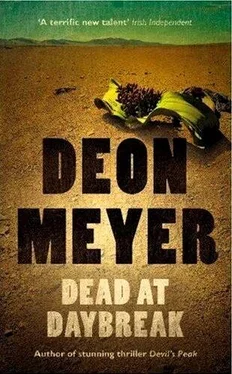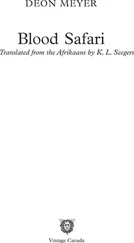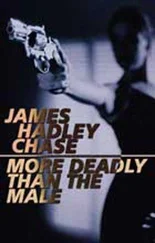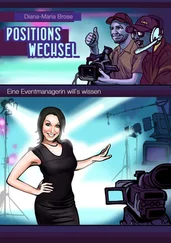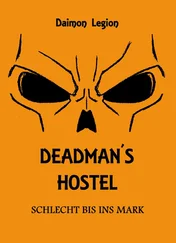A guitar-playing country boy. Behind all this?
He punched a number into the cell phone.
“Murder and Robbery, Mavis Petersen speaking.”
“Mavis, it’s Zatopek van Heerden. Tony O’Grady has just been shot in Café Paradiso, on Kloof Street. You must get hold of Joubert. And tell De Wit as well.”
“Good Lord,” she said.
“Mavis…”
“I hear, Captain. I’ll tell him.”
“Thank you, Mavis.” He cut the call. All hell was going to break loose. But before that happened…“We’ll have to get a map of Cape Town,” he said to Tiny Mpayipheli.
“There’s one in the glove compartment.”
He opened it, took out the map book, looked for Solan Street in the index, found the reference, turned to the map.
“It’s just below us.”
“But are we fetching the attorney first?”
“And James Vergottini.”
Then this whole affair would be sliced open, this Pandora’s box, this can of worms.
At last, a live witness.
Mpayipheli let the Mercedes ML 320’s tires scream around the corner of Kloof Street and the corner Hope had mentioned. An ambulance stood in front of Café Paradiso, a white Opel with blue police lights. They saw Hope’s BMW farther up the street, drove nearer, stopped next to the car.
There was no one near the car.
“Fuck,” said Van Heerden.
“You should become a writer,” said Mpayipheli. “Such a gift for language.”
Van Heerden said nothing. He felt exhausted. Too little sleep. Too much adrenaline. Too much struggling.
Tiny’s cell phone rang again. He answered, listened. Eventually, slowly, he put the phone down.
“That was Orlando. Billy September is dead.”
“Too many,” said Van Heerden. “Too many.”
“Someone will pay,” said Mpayipheli. “Now someone will fucking pay.”
♦
They drove up Solan Street. Warehouses, engineering works, panel beaters, a clothing factory, a Vespa scooter repair shop.
Number 78 was on the corner, an old, rundown, grayish blue single story, long and low, without signboards, its small, high windows protected with excessive burglarproofing. They turned, drove past again. The front door was on Solan Street, a single door on the sidewalk, on the side street a big double door allowing entry for vehicles, a small brass plate next to the front door with a barely legible ORION SOLUTIONS on it.
“Video cameras,” said Tiny, and pointed, but Van Heerden saw nothing.
“Where?”
“Under the overhang of the roof.”
His eyes searched, saw a closed-circuit camera in the shadows, barely visible, then another one.
“Lot of security,” he said.
“What do they do?”
“Rob and murder.”
“For a living?”
“I don’t know.”
“They know we’re here. Those cameras have seen us.”
“I know.”
“You have a plan?”
“Yes.”
“Like the one at the flat?”
“Yes.”
Tiny Mpayipheli shook his head but said nothing. He parked the Mercedes a block away.
“You can’t call the police, because you’re looking for the dollars.”
“Yes.”
“Let me call Orlando. Backup.”
“I’m not going to wait for backup.”
“Jesus, you’re a stupid whitey.”
Van Heerden put his hand into his jacket pocket. “Here’s a list of their shift schedule,” he said, unfolding the piece of paper that had been stuck to the door of the cupboard in the flat. “There are eight names. Schlebusch is dead and I presume the four who were at my mother’s house are on it, because Potgieter led us to the escort agency and the flat. That’s five, plus the one in the flat. Six dead or out of action. And Venter. Do you think we can handle three guys?”
“You want to go in at the front door, where they can see us coming a mile away. Where’s the strategic advantage?”
“Tiny, if Orlando sends a busload of soldiers, it’ll attract attention so fast that the police will be here within minutes.”
“True.”
“Phone Orlando but tell him to give us half an hour. No. An hour.”
Mpayipheli nodded and dialed, spoke. “Orlando’s giving us sixty minutes.” He took out the Rossi, reloaded it with bullets from his jacket pocket. “Never thought I’d go into battle with a white ex-cop,” he said, and opened the car door.
They walked down the road side by side, through the sifting rain, the wind lifting their jackets. Van Heerden looked up at the bulk of the mountain above them, the well-known flat summit covered in low, dark cloud. Just as well. Wouldn’t have been a good sign if it had been clear.
Those weeks after Nagel’s death.
All he had done was stare at the mountain. A huge, unavoidable, permanent reminder of his guilt. Of his badness.
They stood in front of the door. The brass plate bearing the name of the firm was dirty. He put his hand on the latch, turned it. The door swung open. He looked at Tiny, who shrugged his shoulders. They walked in. A large area, dim inside, an empty warehouse, the gray paint faded, the floor a rough cement surface, dusty, dirty. In the gloom he could see a table in a corner. Someone sat there, a dark shadow, unrecognizable, a heavy mass. They walked nearer, Tiny’s hand on the Rossi in the shoulder holster.
The figure at the table started clapping its hands, slowly, the sound of palm upon palm sharp and echoing in the great, empty space, keeping pace with their footfalls on the cement floor. They walked up to the table, the shadows forming themselves into something human: broad, thick neck, shoulders and chest bulging under the camouflage overall, squat, powerful, the face familiar, like a vaguely remembered friend, and then Van Heerden saw the dark mark on the neck, a splash as big as a man’s hand, and the rhythmical clapping stopped and it was suddenly quiet, only the rain pattering softly on the corrugated-iron roof.
“Speckle,” he said.
The face sunburned, the eyes bright and intelligent, the smile sincere, wide, and winning.
“You’re good, Van Heerden, I have to hand it to you. You achieved in…what, six, seven days, something that took the entire SADF twenty-three years.”
It was the voice from the telephone that morning. Quiet. Reasonable. “And now it’s over,” said Van Heerden.
The smile widened, white teeth gleaming. “You’re good, Van Heerden,” he said again. “But you’re not that good.”
“But he’s not alone,” said Tiny Mpayipheli.
“Shut up, kaffir, the white bosses are speaking now.”
Van Heerden felt Mpayipheli stiffen as if an invisible knife had sliced into him.
“It’s over, Speckle.”
“No one calls me Speckle now.” The smile vanished.
“Where’s the will, Speckle?”
He hit the metal table with the flat of his hands, a thunderclap in the room. “Basson!” The exclamation an explosion, he was halfway up, but Tiny’s Rossi was in his hands, big black hands gripped around the stock, the barrel gleaming, a deathly hush in the air.
Slowly Venter sat down again. “They call me Basson,” he said softly, his eyes on Van Heerden as if Mpayipheli didn’t exist. His whisper filled the echoing space.
“Where’s the will?”
“Didn’t you get my message?”
“I didn’t believe your message.”
The smile back again. “Dr. Zatopek van Heerden. Criminal Psychology, if I’m not mistaken.”
Van Heerden said nothing.
“The will is at the back.” The hand indicating a door behind him was large and weather-beaten, the fingers and wrist thick.
“Let’s fetch it.”
“You fetch it. The kaffir and I want to discuss white domination. If he’s not scared of putting down his little gun.”
Mpayipheli turned the Rossi in his hands, holding out the butt to Van Heerden.
Читать дальше
